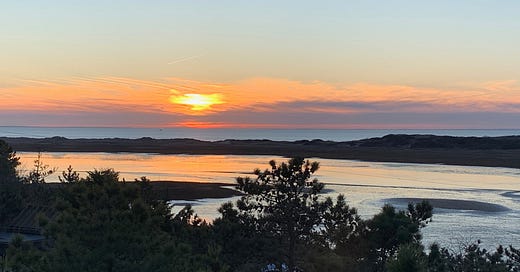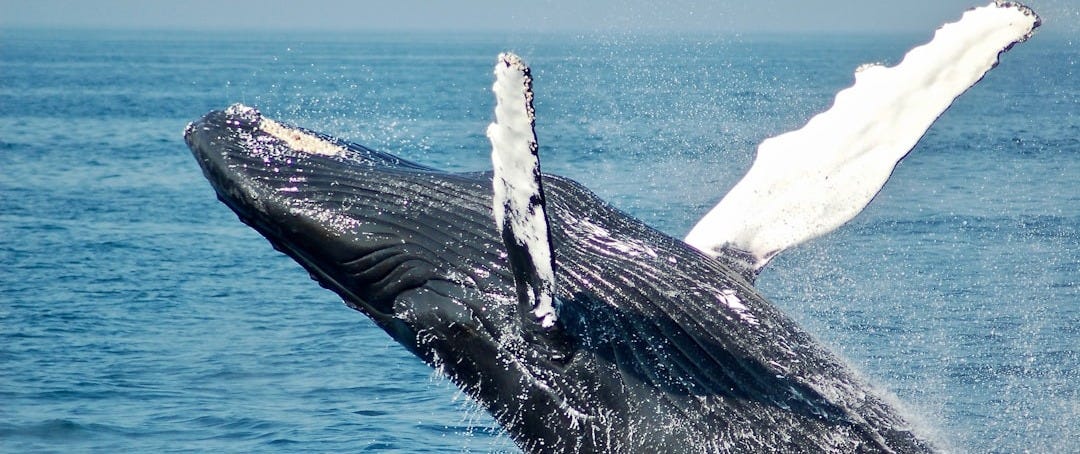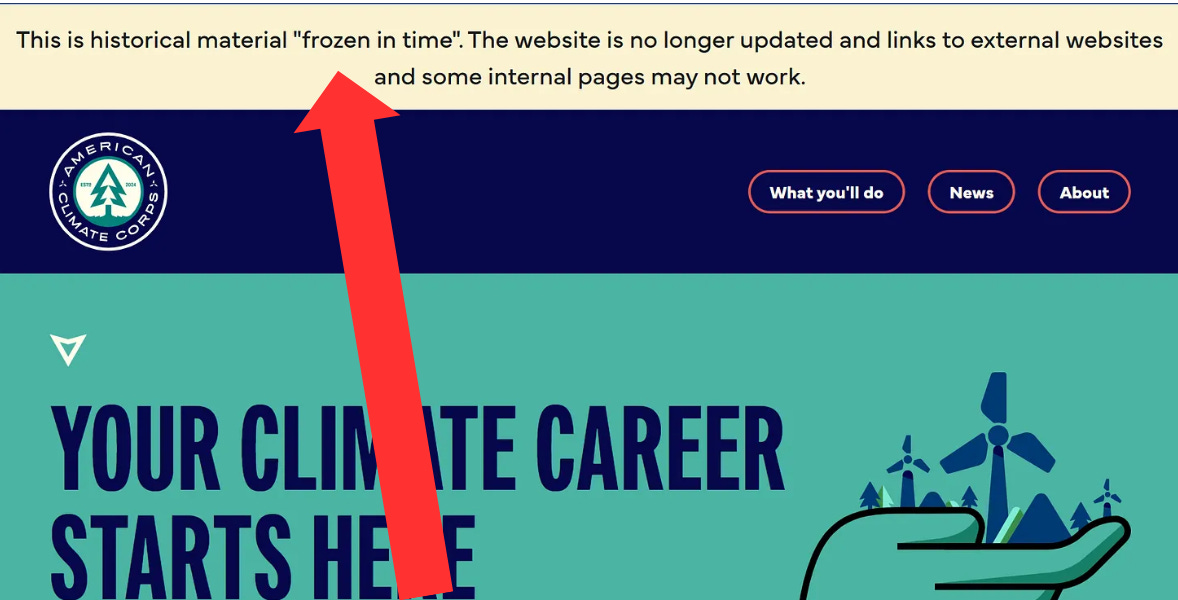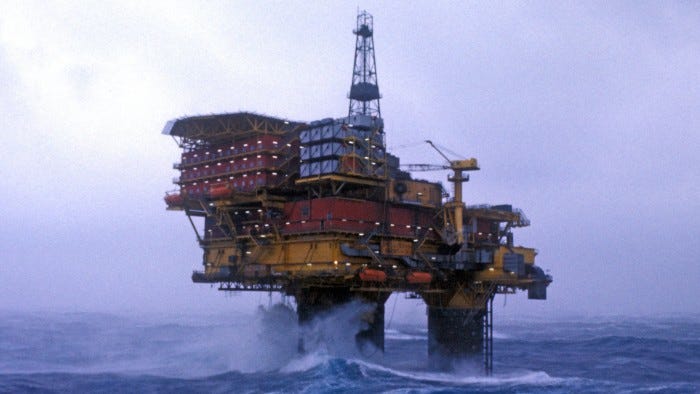Jan 31: Wellfleet's Banksy, whales not driven crazy, funding freeze hits Cape
Also, states take the lead on climate, and a new tool to check your local pond water quality
NOTE: The table of contents items below are linked to the articles, but this feature only works if you are reading the post in Substack while logged in - apologies for the inconvenience.
In this issue:
Cape & Islands
Massachusetts
Is offshore wind driving whales crazy? Scientists say no (Great new, in-depth piece by WCAI’s Eve Zuckoff)
United States
States will make progress on their climate goals, despite Trump’s rollbacks at the federal level
Federal financial assistance freeze still causing havoc; what steps can grant recipients take?
International
Scottish Court overturns Britain’s approvals of Shell and Equinor's North Sea gas, oil projects
Happy Nat Bullard’s Annual Presentation Drop Day (Jan 30) to all who celebrate! Eagerly awaited 200 slides of climate information
Activities and Events
Cape Bridge project - curious about the environment impacts, and path forward? Video of Sierra Club Cape & Islands event
More events and activities, virtual and in-person
Eco-restoration tours, beach clean ups, activities for kids — Check out the Cape Cod Conservation Calender
Cape & Islands

Wellfleet’s own Banksy struck again this winter
“It’s our Mystery Artist,” exclaimed Suzanne Grout Thomas, Wellfleet’s Director of Community Services, “I never figured out who it is!”
This winter, like last, Mystery Artist’s paintings can be found stapled over the wooden boards that in summer hold the beach signs at Powers Landing, Duck Harbor, and Gull Pond. Remnants of canvas can still be found on the board at Long Pond, but the painting is gone.
The artist’s vibrant colors and bold strokes draw the eye, while the images warn of plastic pollution. This year’s painting at Powers Landing is a close up of someone eating a credit card, and instead of a name on the card, it reads “We eat a credit card of microplastics a week.”
“I love the whole thing, and I’ve only heard positive comments,” said Thomas.
“In fact, last year someone loved the paintings so much that they used a chainsaw to saw through the two-by-four posts supporting the boards and took home the paintings from Newcomb Hollow and one other beach, I can’t remember which one,” said Thomas. Thomas does wish she knew who took the paintings and boards home, “the lumber for each of those signs costs about $100.”
But in the end, Thomas laughed off the theft, “It’s Wellfleet. There are a lot of art appreciators here.”

National Science Foundation’s funding freeze is “wreaking havoc” in academic research community — including on Cape Cod
“Cape Cod” brings to mind sandy feet, fresh lobsters and shellfish, maybe ice cream dripping down the side of a cone. But laboratories? Probably not.
And yet, Cape Cod is a research powerhouse. Over half of all federal grant funding awarded in Barnstable County during fiscal years 2022, 2023, and 2024 were new research grants: a total of more than $300M. During that period, the Woods Hole Oceanographic Institution (WHOI) alone was awarded 229 new grants totalling $291M, with the Marine Biological Laboratory awarded 32 new grants totalling $22M, followed by Woodwell Climate Research Center with 14 grants totalling almost $8M, according to the USA Spending database.
The awards come from a number of federal agencies, including the Department of Commerce and NASA, but $135M of that $300M was awarded by the National Science Foundation (NSF). The same NSF where all existing grants are now frozen, as agency employees, many of them PhD scientists, have been directed by the Trump administration to review the more than 40,000 NSF grants to make sure that they comply with the Executive Orders issued last week.
This freeze on NSF grants punches a hole in the research institutions’ ability to cover costs. They count on that money to pay for salaries, rent, lab supplies and equipment, and more. As Science News reported, NSF’s funding block is “wreaking havoc across the academic research community.”
The financial problems caused by the freeze stem from the fact that recipients don’t receive the entire amount of the grant when it’s awarded. Rather, as recipients incur expenses, they submit them to the appropriate agency and draw down funds to cover those costs.
Stat News reported that researchers are stretched thin: ““We just have no idea when we’ll be paid,” said Julia Van Etten, an NSF fellow at both Rutgers University and WHOI, who studies how DNA gets transferred between microbes. “It could be today, with the website going back up. It could be six months from now. I don’t think my grant is gone.”
The grants are being reviewed for what Trump considers to be “woke gender ideology”; diversity, equity, and inclusion; foreign aid; the green new deal; and support for nongovernmental organizations that undermine the national interest.
Science News reported that NSF employees have not been given any written criteria for the review. “Is NSF asking federal scientists to behave unethically?” asks Jesus Soriano, steward for Local 3403 of the American Federation of Government Employees and a program officer within NSF’s engineering directorate. The merit review process to award a grant “does not include words such as woke or green new deal or gender ideology. Those words aren’t in the grant, and I don’t even know what they mean,” Soriano said in reponse to questions from Science News.
As of Friday morning, January 31, the NSF had not given any indication of how long the grant review will take.
Find out how your local ponds are faring
Cape Cod Commission, Jan 16, 2025
This January, the Cape Cod Commission announced a new tool:
For the first time, freshwater data from across Cape Cod is available in one centralized location through the Cape Cod Water Quality Data Portal. This interactive, map-based online tool allows users to explore water quality data compiled by the Commission in collaboration with regional partners.
Users can view trends and access and download more than 25 years of historic data for monitored ponds across the region. The portal, developed in partnership with the Timmons Group, was designed with input from an end-user group that included Town, State, and Federal staff, as well as pond association members and other stakeholders. Full story.
Massachusetts
Is offshore wind driving whales crazy? Science says no
WCAI, by Eve Zuckoff, Jan 22, 2025
To build a wind farm, noise is unavoidable. The offshore wind industry primarily generates underwater noise through High Resolution Geophysical (HRG) surveys prior to construction, to better understand the seafloor, and later, through pile driving to install turbine foundations…
Years of research show that loud underwater noises can disrupt a whale’s ability to navigate the ocean, find prey, avoid predators, and communicate with one another. In more extreme scenarios — and when at close range — loud noises can damage whales’ hearing.
But that's not what's happening here. In fact, a lot is known about how whales respond to HRG surveys and pile driving. Full story.
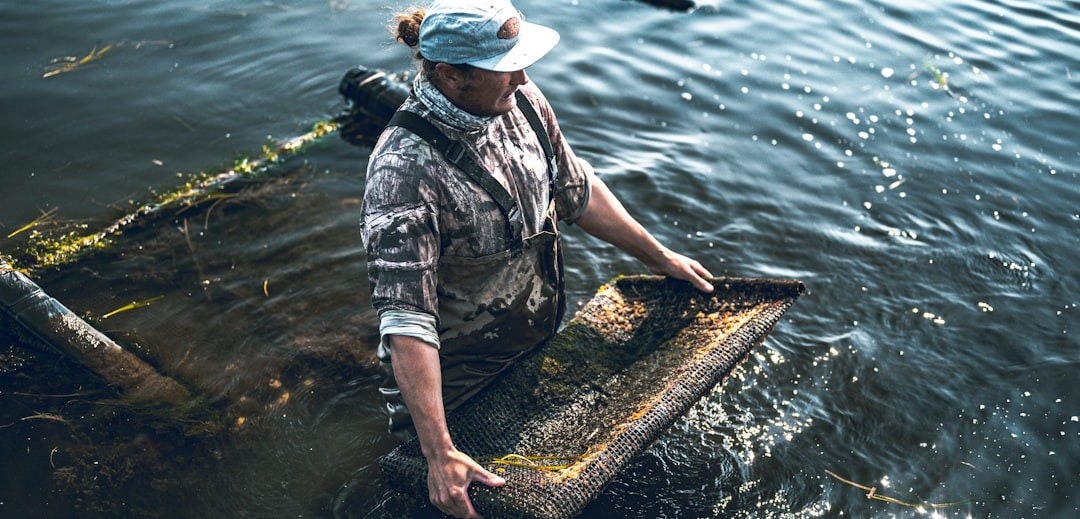
How warmer winter waters are creating new pitfalls for Massachusetts oyster farmers
WBUR’s Morning Newsletter, by Amanda Beland and Nik DeCosta-Klipa, Jan 30, 2025
A common practice for local shellfish harvesters is to pit their oysters in the winter to protect them against ice damage. This means taking oysters out of their watery homes once they’re dormant and putting them in offsite storage until the spring.
Andrew Cummings, who’s been harvesting oysters in Wellfleet for three decades, says warmer water temperatures over the years have made pitting an uncertain, risky call… Luckily water temps have stayed cold this season, but Cummings says the overall instability season-to-season remains a stressor: “ You’re literally like, ‘am I going to have my career next year?’” Full story.
United States
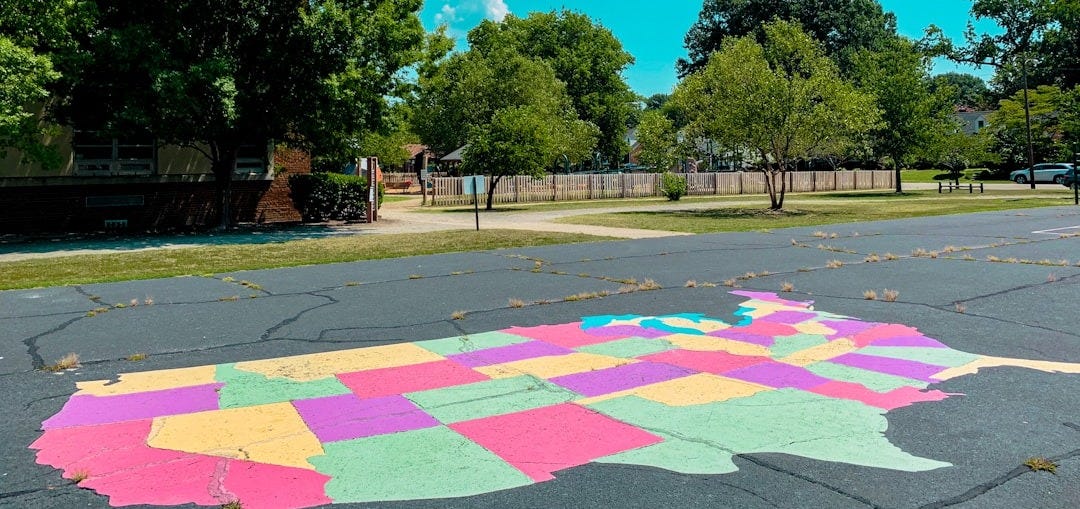
How US states are leading the climate fight – despite Trump’s rollbacks
The Guardian, by Dhana Noor, Jan 30, 2025
“Our states, cities, businesses, and local institutions stand ready to pick up the baton of US climate leadership and do all they can – despite federal complacency – to continue the shift to a clean energy economy,” Gina McCarthy, former climate adviser to Biden and co-chair of the America Is All In coalition of climate-concerned states and cities, said this month.
Some examples listed by the Guardian:
New York — passed “make polluters pay” law; extended fracking ban congestion pricing in Manhattan; passed a new law siting school far from polluting roads; and on January 14, Governor Hochul pledged $1B to “green” the economy with a range of investments.
California — after Trump’s election, legislators called a special session, they are working to allocate $50M to a legal fund to protect their progressive laws.
Rhode Island — in 2021, passed a law requiring RI to procure 100% renewable energy by 2033; the twelve already-permitted offshore wind farms can still move forward (for now); and Governor McKee included a measure in his 2025 budget proposal to lower emissions from building.
Full story here.
We are all living the insanity that is the federal funding freeze, here’s a recap of the past few days
Monday, the country was thrown into chaos with a 2 page memo from the Office of Management and Budget cutting off federal funding for seemingly everything except Medicare and Social Security.
Huge push back from states, Democratic lawmakers, nonprofits, citizens; two lawsuits were filed.
Tuesday, at a hearing in Washington, D.C., federal court, U.S. District Judge Loren AliKhan ordered the Trump administration not to block "open awards," or funds that were already slated to be disbursed, until at least Feb. 3.
Wednesday, the OMB rescinded their freeze order, but says that funding freezes in the Executive Orders still stand, which includes the funding under the Inflation Reduction Act and the Bilateral Infrastructure Law, among other things.
So, where do we stand?
Thursday, Elie Mystal wrote in the Nation: Don’t Be Fooled, the Funding Freeze Drama Is Not Over
By rescinding the implementation memo but keeping the underlying policy (as outlined in the Executive Orders), the Trump administration is causing additional chaos because it is literally impossible to know which programs have been “paused” and which ones are still able to make payroll.
The second reason for the rescission is to moot the court cases against the policy… Even a court that moves as fast as humanly possible cannot keep pace with an administration that changes what it’s doing every time the sun goes down and Stephen Miller emerges from his crypt.
What does Mystal see coming?
The funding fight is far from over, and an organization or university that relies on federal funds already authorized by Congress still has no idea if the check is coming in the mail, and if so, if it will be coming next month as well. The point of this order was to sow chaos and chaos still reigns over the entire federal funding environment. Full story.
Indeed, EPA’s block of already contracted funds for solar installations continued Wednesday
E&E News by Politico, By Jean Chemnick, Jan 30, 2025
The Solar for All program recipients — state and local government agencies and a few nonprofits — have signed contracts with EPA amounting to $7 billion. The program is part of the Inflation Reduction Act and is designed to help offset climate pollution and energy costs by financing community and rooftop solar in low-income communities…
Four recipients contacted by POLITICO’s E&E News said they had lost access to EPA’s online grant management portal, called the Automated Standard Application for Payments, or ASAP, on Wednesday morning — more than 12 hours after a federal judge temporarily blocked Trump’s expansive spending freeze…Two said their EPA program managers had cut off contact.
The solar grants are all obligated, meaning that the federal government can’t legally claw back any of the contracted funds unless there is malfeasance on the part of the recipient, according to legal experts.
Zealan Hoover, the Biden administration’s implementation lead for programs under the Inflation Reduction Act and the infrastructure bill, said roughly $50 billion in grants administered by EPA under those two laws are still frozen, pending reviews by the administration.
“They’ve frozen all [bipartisan infrastructure law] and IRA programs. That has not changed today,” said Hoover, who remains in contact with grantees since leaving the agency. “Everyone’s been getting rejections.” Full story.
Possible next steps for grant recipients with questions
Lawfirm Venable LLC posted some advice for grant recipients looking for more information: What immediate next steps should I be taking right now?
Freezing funds appropriated by Congress is unconstitutional and illegal (Just has to be underscored)
One First, by Steve Vladeck, Jan 27, 2025
Stephen Vladeck is a professor at the Georgetown University Law Center, where he specializes in the federal courts, constitutional law, national security law, and military justice.
In essence, the Trump administration is claiming the unilateral power to at least temporarily “impound” tens of billions of dollars of appropriated funds—in direct conflict with Congress’s constitutional power of the purse, and in even more flagrant violation of the Impoundment Control Act of 1974 (ICA).
When, not if, recipients of the frozen funds sue to challenge agencies’ compliance with the Vaeth memo, it’s a virtual certainty that the Trump administration will argue that the ICA is unconstitutional and that the President has inherent constitutional authority to impound. That argument is a loser, but it’s a good bet that it’s going to be up to the Supreme Court to say so—and probably a heck of a lot sooner than we might have predicted as recently as yesterday. Full post.
International
Scottish Court overturns Britain’s approvals for Shell and Equinor's North Sea gas, oil projects
Reuters, By Sam Tobin and Susanna Twidale, Jan 30, 2025
Britain's approvals for two vast North Sea oil and gas fields were overturned by a Scottish court on Thursday, a significant win for environmental campaigners that leaves the decision on whether the projects should go ahead with the government.
Shell (SHEL.L), opens new tab and Equinor (EQNR.OL), opens new tab fought to uphold approval for the projects in the face of challenges by Greenpeace and Uplift, which argued the approvals unlawfully failed to take into account the emissions that would come from the oil and gas being used, known as downstream emissions. Full story.
More good news — Marshall Islands protects ‘pristine’ Pacific corals with first marine sanctuary
Mongabay, by Shanna Hanbury, Jan 28, 2025
The new 18,500-square-mile marine sanctuary covers two of the country’s northernmost uninhabited atolls, Bikar and Bokak, and the surrounding deep sea, and it is the first federal marine protected area (MPA) established by the Pacific Island nation nestled between Hawaii and the Philippines.
The area is teeming with rare and endangered marine wildlife, including green sea turtles (Chelonia mydas) and fish species such as the Napoleon wrasse (Cheilinus undulatus) and the bumphead parrotfish (Bolbometopon muricatum). Researchers also noted there is a high potential for discovering new species of fish and invertebrates in the deep seas.
In the lead-up to the MPA’s creation, National Geographic’s Pristine Seas team led by marine biologist Enric Sala, in collaboration the Marshall Islands Marine Resources Authority, spent almost 650 hours diving in the Marshall Islands to study marine life as part of a five-year expedition across the Pacific.
Their findings were significant: The region had the highest reef fish biomass in the Pacific Ocean. Giant clams (Tridacna maxima) were found in huge numbers. Deep-sea sharks, many of which are threatened, were abundant. And the atolls not only had the highest coral cover in the central and western Pacific but were also found to be especially resilient to global warming. Full story.
Jan 30 was Nat Bullard Annual Presentation Drop Day
Happy day to all those who celebrate! 200 slides with data on so many different aspects of climate. Will dig into these in future newsletters, but for the moment, just enjoy. Find the presentation here.
Activities and Events
ICYMI, Video — Update and environmental effects of Cape Cod Bridges Project, a discussion with Megaproject Leader
Sierra Club Cape Cod’s 2025 “3rd Tuesday Talk” series began January 21st by featuring Luisa Paiewonsky, leader of the Massachusetts Department of Transportation’s new Office of Megaproject Delivery, addressing the environmental and equity impacts of the Cape Cod Bridges Program.
🎦Watch video here.
Feb 4, Virtual — Woodwell Climate Research Center, Our Climate Future: Fact + Fiction
How do we create a rich, nuanced vision of our climate future that can motivate and guide climate action today? This virtual event brings together a diverse panel of experts to explore the relative strengths of science and science fiction—and the potential synergies between the two—in understanding what the future might look like. Information and registration HERE. Free.
📅Feb 4, 1:30-2:30 pm 🗺️📌Virtual
Feb 19, In Person — Center for Coastal Studies, Dr. Casey Thornbrugh of the Mashpee Wampanoag Tribe on Climate Change
The Napi’s Winter Lecture Series continues on Wednesday, Feb. 19, at 5 pm at the Center for Coastal Studies’ Hiebert Marine Lab with a talk by Dr. Casey Thornbrugh of the Mashpee Wampanoag Tribe. Refreshments will be served. The event is free and open to the public.
Dr. Thornbrugh will discuss climate change impacts and adaptation, and the challenges faced by Tribal Nations and Indigenous Communities, with an emphasis on East Coast and coastal regions. “Tribal Nations are leading the way in climate change adaptation planning and resilience,” said Dr. Thornbrugh.
More information and registration here. Free.
📅Feb 19, 5:00 - 7:00 pm 🗺️📌5 Holway Ave, Provincetown, MA 02657
Feb 26, In Person — Woodwell Climate Research Center, Life in the Pyrocene, Wildfire science for solutions from the Arctic to the Amazon
Fueled by climate warming and land use, wildfires are a growing threat to climate, people, and ecosystems around the world. From the Arctic to the Amazon, Woodwell scientists are working to develop technological innovations, engage fire managers, and inform policy for wildfire solutions.
Come learn more about the science and paths forward for managing wildfire in a warming world.
More information and registration here. Free.
📅Feb 26, 5:00 - 7:00 pm 🗺️📌149 Woods Hole Road, Falmouth, MA 02540
Eco-restoration tours, beach clean ups, activities for kids — Check out the Cape Cod Conservation Calender HERE
Powered by the “Communications Cohort,” co-led by the Barnstable Land Trust and APCC.

